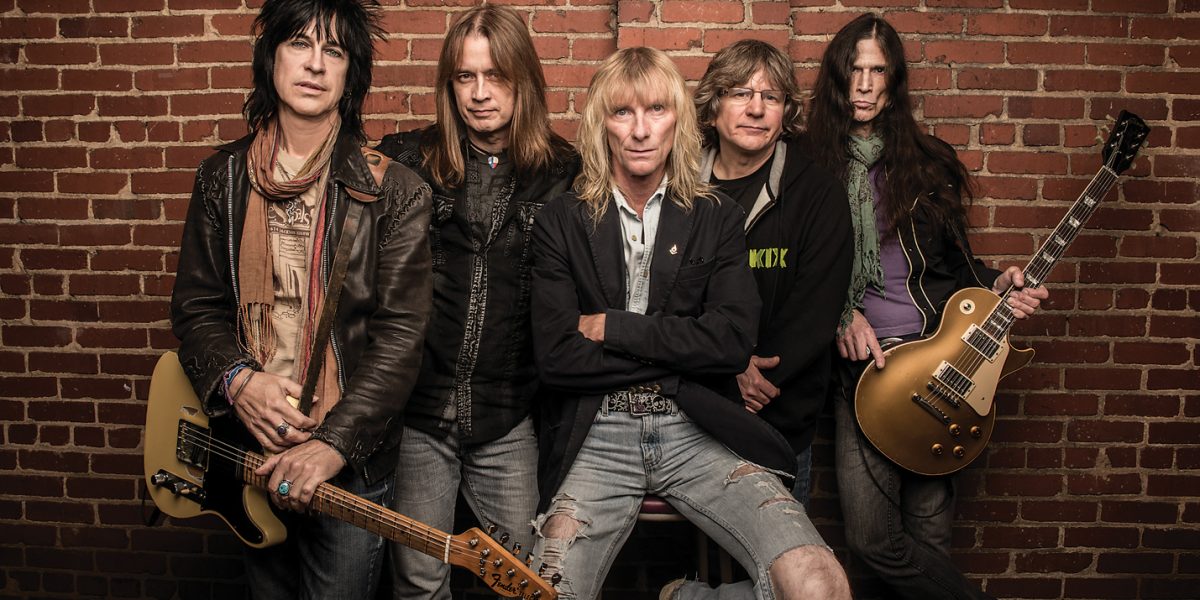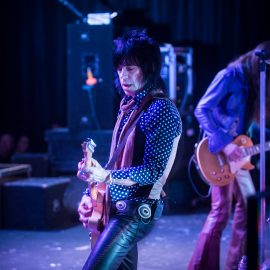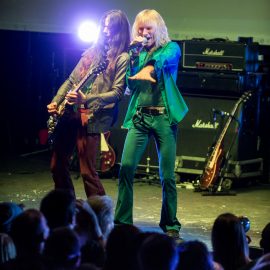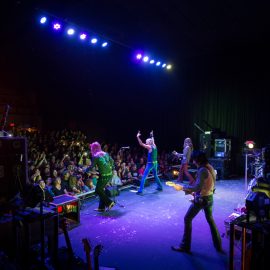Arts & Culture
Hair Apparent
The 1980s metal rock band Kix returns for an improbable, but gratifying, encore.
The T-shirts tell a story. At any concert, the shirts worn by fans offer a carefully curated peek into the band’s history and appeal, and the attire at a recent Kix show at Rams Head Live does exactly that. There are shirts bearing the logos of Mötley Crüe, Winger, and Ratt, bands considered Kix’s contemporaries in the late-1980s/early-1990s hair-metal scene. Other tees rep classic-rock bands like The Rolling Stones, Led Zeppelin, and AC/DC—acts that inspired Kix’s high-voltage swagger—and a few nod to punk influences like The Ramones and The Clash. And then there are the Kix shirts, some of them at least 20 years old, emblazoned with mottos like “Dirty Boys of the Underground” and “Rock and Roll Overdose.” Suggesting decadence, they seem to be in dialogue with the generic “Sex, Drugs & Rock ‘n’ Roll” and “Good Girls Go to Heaven, Bad Girls Go Backstage” shirts circulating through the club.
These folks are
all devoted fans. Numbering about 50 or so, they’ve shown up hours before the concert for a “soundcheck party” sponsored by 98 Rock.
Many of them remember when Kix’s power ballad, “Don’t Close Your Eyes,” cracked the Top 40 in 1989 and eventually peaked at No. 11 (between songs by Cher and Paula Abdul). They recall the now-legendary shows at Hammerjacks and tours opening for the likes of Aerosmith. They remember when Kix ruled Baltimore.
“They are rock and roll royalty in this town,” says 48-year-old Brian “Metal” McBride, a longtime fan and Internet radio DJ. “The people of Baltimore feel a kinship with Kix.”
Standing nearby, Cavett Kwiatkowski—his friends call him “Stick”—agrees. “They almost feel like family at this point,” says the 47-year-old Kwiatkowski, proudly sporting a Kix bandana and shirt. “We grew up together, them and me.”
Evan Richards can’t say that. He wasn’t even born when McBride and Kwiatkowski were banging heads and pumping fists at Hammerjacks. “They’ve always been my favorite band,” says the 21-year-old, who first heard Kix listening to 98 Rock as a teenager. “They kick ass.”
“I actually heard Casey Kasem say my name on the radio. How cool is that?”
Kix’s appearance onstage halts all conversation, and the fans press forward, as guitars tune and drums pound. The guys in the band are dressed casually for this soundcheck—no leather pants, scarves, or snakeskin boots just yet—and look remarkably fit for middle-aged rockers.
Launching into a new song, “Mean Miss Adventure,” they smile easily and appear genuinely pleased to be in each other’s company. They are, after all, in the midst of an unlikely resurgence—the band disbanded from 1995 to 2003—and the second career has proved more lucrative than the first. A recent album,
Rock Your Face Off, is their first release in nearly 20 years.
Singer Steve Whiteman, sporting an Orioles jersey, shimmies in place, as guitarists Brian Forsythe and Ronnie Younkins circle the stage staking out positions and checking the monitor mix. Bassist Mark Schenker drifts toward drummer Jimmy Chalfant, the two of them creating a walloping beat that seems at odds with their nonchalant demeanor.
As the tune winds down, Whiteman jokes that he’s still working on his moves for the new material and asks his bandmates if they’re all set. They nod.
“Play one more!” someone hollers.
Whiteman turns in the direction of the request and furrows his brow in mock exasperation. “I can’t,” he says, “because I gotta save it for the big show. After all, I’m no spring chicken anymore.”
The members of Kix first got together nearly 40 years ago in Frederick. At the time, all of them were banging around Western Maryland in cover bands with names like Nova, Starship, Mama Kin, and Atlas Ram.
Forsythe, for his part, dropped out of high school and headed south with two musician friends. They gigged around Alabama and Mississippi, playing everything from KC and the Sunshine Band to Lynyrd Skynyrd, sometimes performing Skynyrd’s “Gimme Three Steps” three or four times a night. At one point, they even auditioned to be Hank Williams Jr.’s backing band, but didn’t get the job.
After returning home, Forsythe ran into Ronnie Younkins at a 7-Eleven on Route 40. Over microwaved burritos, Younkins invited the guitarist to join a band he’d formed with Donnie Purnell, a talented local songwriter and bassist. Forsythe, impressed by Purnell’s songs and determination to get a record deal, eventually came aboard, and the quartet began practicing in Forsythe’s parents’ basement in late 1977.
They went through a few lead singers (including a guy named “Buffalo Ed”) before meeting Whiteman—at that time, a drummer with a knack for singing Zeppelin songs—and his band at a club in Cumberland. Sensing Whiteman was a perfect match for their original material, they took him out to Purnell’s VW Beetle between sets and played a tape of the songs they’d been practicing.
Whiteman joined the band on the spot. “I didn’t want to be in a cover band forever,” he recalls, sitting backstage before the Rams Head show. “I knew it was the right thing to do.”
The group—which called itself The Shooze, and then The Generators, before settling on Kix—began a grueling cycle of rehearsals, club shows, and more rehearsals. That regimen continued for years and turned them into an explosive live act. An Atlantic Records rep came to a 1981 gig at The Stardust Inn in Waldorf and was so impressed that he flew the band to New York for a showcase with fellow record executives.
Forsythe says the show ended with the label’s president shaking hands with the band and asking, “Well boys, how would you like to be on Atlantic Records?”
“It was like something out of a dream,” says Forsythe, still astonished by the memory.
“We were shittin’ ourselves,” adds Whiteman. “We were on our way. Or so we thought.”
The next decade was a whirlwind of, well, pretty much the same thing—band practice and shows, though the tours got longer and the venues grew larger. “Not much really changed,” notes Whiteman. “But we did record our albums in some exotic studios.”
Indeed, Kix recorded in A-list studios in New York, Los Angeles, and Miami, racked up huge tabs, and rubbed elbows with celebrities in the process. Forsythe remembers running into David Bowie, Boy George, Andy Warhol, AC/DC, and Johnny Depp over the years. One night in L.A., he rented movies and drank margaritas with members of U2, who were at the same studio mixing a song. And he once left his car in a studio parking lot overnight, only to get a frantic call the next morning saying he had to move it immediately—it was in the spot reserved for Barbra Streisand’s motor home. “When I got there, she was pissed,” says Forsythe, who moved the car.
Kix’s first three records sold modestly, but that changed with 1988’s
Blow My Fuse, which spawned the hit “Don’t Close Your Eyes” and eventually went platinum. “I actually heard Casey Kasem say my name on the radio,” says Whiteman. “How cool is that?!”
After touring for 18 months—“we essentially didn’t go home for a year-and-a-half,” the singer notes—they were summoned to Atlantic’s New York headquarters. “We sat around this big table with all the suits,” recalls Whiteman. “They said, ‘Well boys, you’ve had a great run. We’d like to get another record done and do it again. You only owe us a million dollars now.'”
“I thought, ‘It’s a career, put a fork in it, time to move on.'”
Whiteman thought they were kidding and that the band had come to New York to collect a check. But they weren’t joking. The spiraling costs of studio fees and promotion expenses had resulted in substantial debt.
Still, Kix soldiered on and recorded what Forsythe considers the band’s best record,
Hot Wire. It was released in July 1991, just weeks before Nirvana’s Nevermind, the album that launched Seattle’s grunge sound and made Kix’s brand of flamboyant hard rock irrelevant practically overnight. “There was a new party in town, and we weren’t invited,” says Whiteman. “We kept at it for a few more years, but the crowds kept getting smaller. I thought, ‘It’s a career, put a fork in it, time to move on.'”
Kix was done. Forsythe relocated to Los Angeles, where he played with hard rockers Rhino Bucket and the country group The Snakehandlers. Though the other guys formed bands, they settled into lives built around wives, children, and day jobs. Whiteman, who’s been married for 31 years, teaches singing at the Musician’s Institute of Baltimore. “I put Kix behind me, and I was okay with that,” he says. “It was over.”
Or so he thought.
Rocklahoma changed everything. A persistent booking agent arranged for Kix to play the four-day rock festival in Pryor, OK, in 2008, though Whiteman was skeptical. The band had reunited, with Mark Schenker on bass, to play some one-off shows around Baltimore, but hadn’t ventured outside that comfort zone and didn’t know what to expect.
They took the stage during a torrential downpour that didn’t deter the 20,000 fans cheering every song. “It opened all our eyes,” says Whiteman. “We had no idea that many people still cared.”
It led to a steady stream of bookings at festivals (including the M3 Rock Festival at Merriweather Post Pavilion), casinos, cruises, and clubs. Instead of touring for weeks at a time crammed into a van, they usually fly in on a Friday, play the show on Saturday, and fly home on Sunday. Their annual “Kix Mas” show at Rams Head is scheduled for December 20.
Because they aren’t paying lawyers, accountants, and studio bills, they actually make more money now than back in the day. Instead of working through a giant corporation like Atlantic, they record for Loud & Proud, an indie label with a roster that also includes Steve Miller Band and Rush. “It’s more personal,” says Forsythe, “and we have so much more control over what we do.”
“It feels pretty damn good,” says Whiteman. “Everybody took good care of themselves, and hopefully, we can keep doing this as long as people want us to.”
Smiling, Forsythe thinks of yet another reason to be grateful; in fact, it’s something many of Kix’s rock and roll contemporaries no longer have.
“We lucked out,” he says. “We all still have our hair.”







